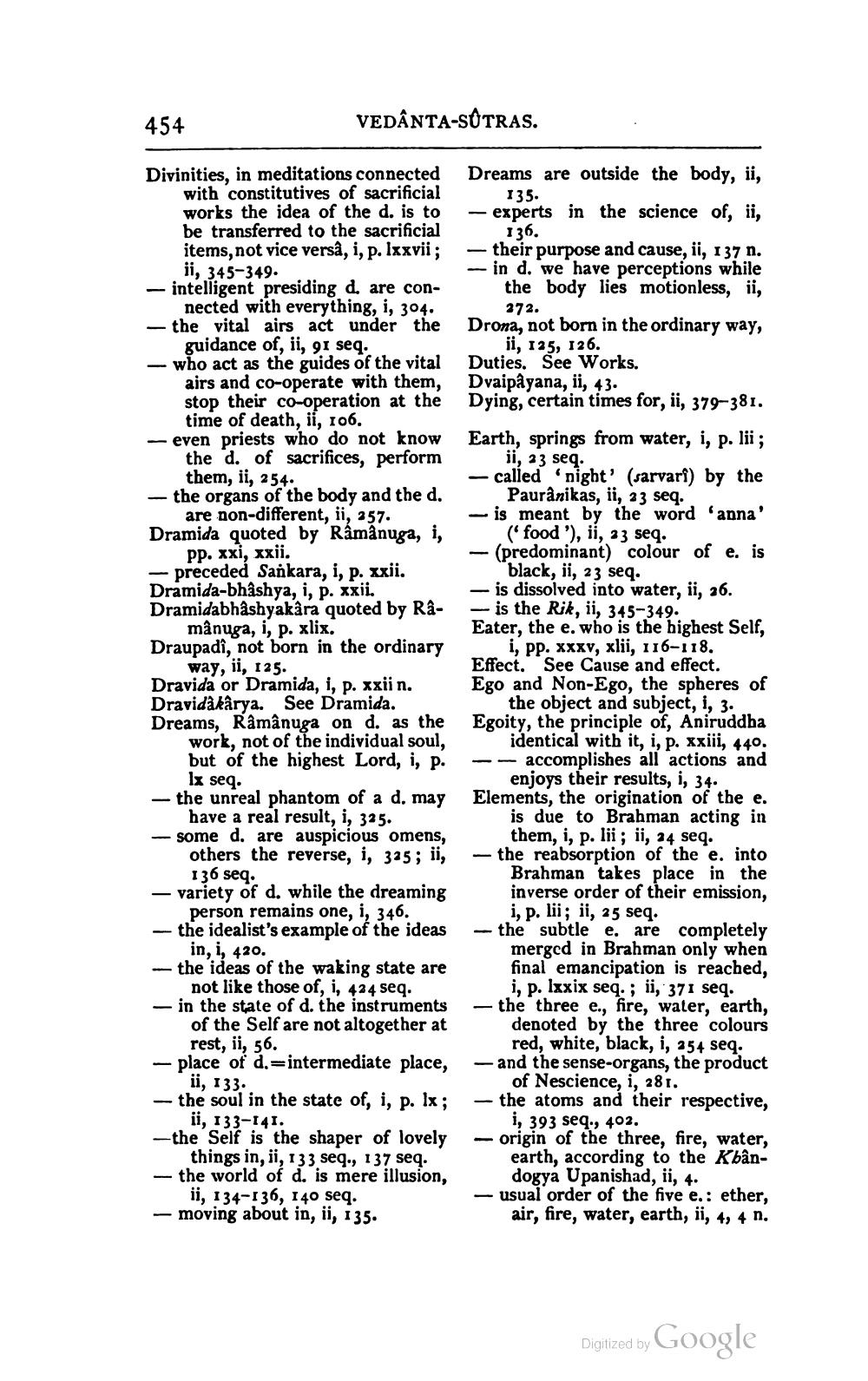________________
454
VEDÂNTA-SOTRAS.
Dreams are outside the body, ii,
135. — experts in the science of, ii,
136. - their purpose and cause, ii, 137 n. -- in d. we have perceptions while
the body lies motionless, ii,
272. Drona, not born in the ordinary way,
ii, 125, 126. Duties. See Works. Dvaipayana, ii, 43. Dying, certain times for, ii, 379-381.
perform
rau
Dramie Don-diof the me
Divinities, in meditations connected
with constitutives of sacrificial works the idea of the d. is to be transferred to the sacrificial items, not vice versa, i, p. Ixxvii;
ii, 345-349. - intelligent presiding d. are con
nected with everything, i, 304. - the vital airs act under the
guidance of, ii, 91 seq. -- who act as the guides of the vital
airs and co-operate with them, stop their co-operation at the
time of death, ii, 106. even priests who do not know the d. of sacrifices, perform
them, ii, 254. - the organs of the body and the d.
are non-different, ii, 257. Dramida quoted by Râmânuga, i,
PP. xxi, xxii. - preceded Sankara, i, p. xxii. Dramida-bhashya, i, p. xxii. Dramidabhâshyakâra quoted by Ra
mânuga, i, p. xlix. Draupadî, not born in the ordinary
way, ii, 125. Dravida or Dramida, i, p. xxii n. Dravidåkarya. See Dramida. Dreams, Râmânuga on d. as the
work, not of the individual soul, but of the highest Lord, i, p.
Ix seq. - the unreal phantom of a d. may
have a real result, i, 325. - some d. are auspicious omens,
others the reverse, i, 325; ii,
136 seq. - variety of d. while the dreaming
person remains one, i, 346. - the idealist's example of the ideas
in, i, 420. the ideas of the waking state are
not like those of, i, 424 seq. - in the state of d. the instruments
of the Self are not altogether at
rest, ii, 56. - place of d.=intermediate place,
ii, 133. - the soul in the state of, i, p. Ix;
ii, 133-141. --the Self is the shaper of lovely
things in, ii, 133 seg., 137 seq. the world of d. is mere illusion,
ii, 134-136, 140 seq. moving about in, ii, 135.
Earth, springs from water, i, p. lii;
ii, 23 seq. - called night' (sarvari) by the
Pauranikas, ii, 23 seq. - is meant by the word 'anna'
('food '), ii, 23 seq. (predominant) colour of e. is
black, ii, 23 seq. - is dissolved into water, ii, 26. - is the Rik, ii, 345-349. Eater, the e. who is the highest Self,
i, pp. xxxv, xlii, 116-118. Effect. See Cause and effect. Ego and Non-Ego, the spheres of
the object and subject, i, 3. Egoity, the principle of, Aniruddha
identical with it, i, p. xxiii, 440. -- accomplishes all actions and
enjoys their results, i, 34. Elements, the origination of the e.
is due to Brahman acting in
them, i, p. lii; ii, 24 seq. - the reabsorption of the e. into
Brahman takes place in the inverse order of their emission,
i, p. lii; ii, 25 seq. - the subtle e, are completely
merged in Brahman only when final emancipation is reached,
i, p. lxxix seq. ; ii, 371 seq. - the three e., fire, water, earth,
denoted by the three colours
red, white, black, i, 254 seq. - and the sense-organs, the product
of Nescience, i, 281. – the atoms and their respective,
i, 393 seq., 402. - origin of the three, fire, water,
earth, according to the Kbân
dogya Upanishad, ii, 4. - usual order of the five e.: ether,
air, fire, water, earth, ii, 4, 4 n.
Of Neesense.Olack, free co
*;
Digized by Google




